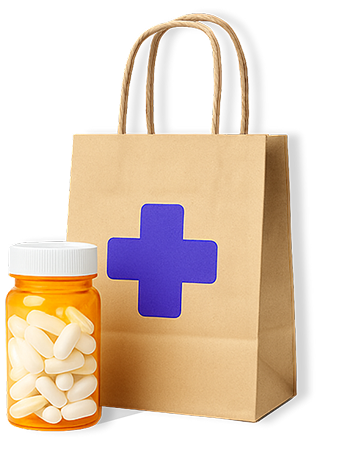Get a Prescription for Beta Blockers Online
See a virtual doctor to request an online beta blocker prescription for blood pressure and heart health support. Available 24/7.


Available in 50 states. Insurance accepted.
Fast
virtual visits
24/7 care
assistants
Prescriptions
as needed

24/7 Personal Care
Consult with a physician in 15 minutes, refill an Rx or chat with our care assistants.

Affordable & Convenient
See your cost upfront and get treatment for hundreds of different conditions.

Insurance Accepted
We accept most major insurance plans, making healthcare easy and affordable.
See If Delivery Is Available Near You
Delivery Not Available
Enter your ZIP code to check if prescription delivery is available in your area and how soon your meds could arrive.
How to get started
Choose your doctor, start a virtual visit, and have your prescriptions sent to your preferred pharmacy for pickup — all in just a few easy steps.
Choose a doctor
Choose a physician by availability, specialty, ratings, and more.

Start your video visit
Connect with a doctor in minutes on a secure video call.

Get your prescription
Pick up your meds or have them delivered in as little as an hour.

Available in 50 states. Insurance accepted.
One-Time
Physician Visit
One-time visit with a physician for diagnosis, treatment, Rx, labs, referrals, and doctor’s notes.
Accepted Insurances
See why people turn to DrHouse...
As seen in

Beta Blockers
What are beta blockers?
Beta blockers, also known as beta-adrenergic blocking agents, are a class of medications that reduce blood pressure by blocking the effects of the hormone epinephrine, also known as adrenaline.
By inhibiting the action of adrenaline on the heart and blood vessels, beta blockers help to decrease heart rate, reduce the force of heart contractions, and lessen the contraction of blood vessels in the heart, brain, and throughout the body. This mechanism helps in managing the symptoms of various cardiovascular conditions.
Beta blockers are primarily used for managing cardiovascular diseases, including hypertension (high blood pressure), angina (chest pain), heart rhythm disorders, and heart failure. They are also prescribed post-heart attack to improve survival rates and prevent future heart attacks.
In addition to these uses, beta blockers can help in treating other conditions such as migraine, certain types of tremors, and anxiety, particularly in situations that induce performance anxiety.
What are beta blockers used to treat?
Beta blockers are used to treat a variety of conditions, primarily related to cardiovascular health. Here’s a list of common conditions that beta blockers are used to manage:
- Hypertension (high blood pressure): Beta blockers reduce the heart rate and the force of the heart’s contractions, lowering blood pressure.
- Angina (chest pain): By decreasing the demand on the heart, beta blockers relieve symptoms of angina.
- Arrhythmias (irregular heartbeat): These medications help to stabilize the heart rhythm.
- Heart failure: Beta blockers are used to manage heart failure symptoms and prevent further damage.
- Myocardial infarction (heart attack): Post-heart attack, beta blockers are prescribed to prevent future attacks and improve survival rates.
- Migraine: They are often prescribed to reduce the frequency and severity of migraine attacks.
- Anxiety: Particularly for situational anxiety and performance anxiety, they help by blocking the physical effects of anxiety.
- Hyperthyroidism: Beta blockers can alleviate symptoms of high thyroid activity like tremors and palpitations.
- Portal hypertension: They are used in managing high blood pressure in the veins of the liver.
- Tremors: Essential tremors, a nervous system disorder that causes rhythmic shaking, can be treated with beta blockers.
Types of beta blockers
Beta blockers can be categorized based on their selectivity for beta-adrenergic receptors and their additional pharmacological actions. Here are the main types:
- Non-selective beta blockers: These affect both beta-1 (β1) and beta-2 (β2) receptors. They are used to treat a variety of conditions, but because they affect β2 receptors found in the lungs, they can cause respiratory side effects, such as wheezing in susceptible individuals.
- Selective beta blockers (beta-1 blockers): These primarily affect β1 receptors, which are predominantly located in the heart. They are typically preferred for patients with asthma or COPD, as they are less likely to provoke respiratory side effects.
- Beta blockers with intrinsic sympathomimetic activity (ISA): These beta blockers can both block and partially stimulate beta receptors, potentially causing fewer side effects related to bradycardia (slow heart rate) and lipid metabolism.
- Beta blockers with alpha-blocking properties: These medications block both beta and alpha receptors, which can be beneficial for treating certain types of hypertension and heart failure by reducing vascular resistance.
How do beta blockers work?
Beta blockers work by blocking the effects of the hormone epinephrine, also known as adrenaline, which is a part of the body’s natural “fight or flight” response.
This hormone typically increases heart rate, opens airways, increases blood flow to muscles, and helps the body make more sugar to fuel muscles. Beta blockers interfere with these effects, thus reducing heart rate, decreasing blood pressure, and lessening the force of the heart’s contractions.
Here’s how beta blockers achieve their effects:
- Heart rate reduction: By blocking beta-1 (β1) receptors in the heart, beta blockers reduce the heart rate, which lessens the heart’s workload and oxygen demand.
- Decrease in blood pressure: Beta blockers reduce the release of renin from the kidneys, a hormone that is involved in increasing blood pressure. By decreasing the levels of renin, they help lower blood pressure.
- Reduced force of heart contractions: By inhibiting the effects of adrenaline on the heart, beta blockers reduce the force with which the heart muscle contracts, further lowering blood pressure and decreasing the heart’s oxygen demand.
- Narrowing of blood vessels: Some beta blockers also block beta-2 (β2) receptors, which can lead to narrowing of the blood vessels. However, this is more typical of non-selective beta blockers.
Side effects of beta blockers
Common side effects associated with beta blockers include:
- Fatigue: Many patients report feeling unusually tired when taking beta blockers.
- Cold hands and feet: Beta blockers can reduce blood circulation, which might make your extremities feel colder.
- Weight gain: Some people might notice weight gain when taking beta blockers.
- Dizziness or lightheadedness: This can occur, particularly when standing up quickly, due to a drop in blood pressure.
- Depression: There have been reports linking beta blockers with mood changes, including depression.
- Sleep disturbances: Beta blockers can affect sleep patterns, potentially causing nightmares or insomnia.
- Slow heartbeat (bradycardia): Since beta blockers reduce heart rate, they can sometimes lower it too much.
- Symptoms of asthma worsening: Non-selective beta blockers can constrict the airways, which might exacerbate asthma symptoms.
- Sexual dysfunction: Some users of beta blockers may experience reduced libido or other issues related to sexual function.
More serious, but less common side effects may include severe allergic reactions, marked bradycardia, heart failure, or severe skin reactions.
List of common beta blockers
Down below is a list of common beta blockers, each with specific applications and characteristics, making them suitable for various medical conditions:
- Propranolol: Often used for hypertension, arrhythmias, and migraine prophylaxis.
- Atenolol: Typically prescribed for hypertension, angina, and sometimes for heart rhythm disorders.
- Metoprolol: Commonly used for hypertension, heart failure, and to improve survival after a heart attack.
- Nadolol: Used for hypertension and to prevent chest pain.
- Timolol: Mainly prescribed for preventing migraines and treating certain types of glaucoma.
- Labetalol: A choice for managing severe hypertension, including during pregnancy.
- Carvedilol: Used for heart failure, hypertension, and to improve survival after a heart attack due to its alpha-blocking properties.
- Bisoprolol: Frequently prescribed for heart failure and hypertension.
- Sotalol: Unique for its use in controlling heart rhythms, in addition to typical beta blocker applications.
- Acebutolol: Known for its intrinsic sympathomimetic activity, used for hypertension and arrhythmias.
How can DrHouse help?
DrHouse is a telehealth app that provides users with 24/7 access to medical expertise, allowing patients to manage their health conveniently from home. With the ability to consult healthcare professionals online, DrHouse caters to a wide range of conditions, including those requiring medication management like beta blockers. Patients can receive online prescriptions swiftly, ensuring that they have timely access to necessary medications.
Whether you need a new prescription, refill an existing one, guidance on managing your medication, insights into potential side effects, or just want a quick consultation with a healthcare professional—DrHouse is here for you.
Sign up now and join countless others who are making informed decisions about their health, all from the comfort of their homes. Don’t wait—your health matters!
Frequently asked questions (FAQs)
Can I get an online prescription for beta blockers from DrHouse?
Yes, if our healthcare professionals determine that beta blockers are an appropriate treatment for your condition, they can provide you with an online prescription through the DrHouse app.
Can I use DrHouse to manage my current beta blocker prescription?
Yes, you can consult with our healthcare professionals about managing your current beta blocker medication. They can also provide guidance on potential side effects, dosage adjustments, and other concerns related to your medication.
Can I get a refill for my existing beta blocker prescription from DrHouse?
Yes, if our healthcare professionals determine that a refill is appropriate for your condition, they can provide you with an online prescription through the DrHouse app. However, please note that certain restrictions may apply depending on your location and local regulations.
Related services
Explore more of our services tailored to your needs and discover additional ways we can support your healthcare needs.
Frequently asked questions




